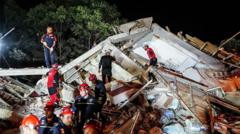The recent missile attacks from Iran on a significant US military base signal critical developments in US-Iran relations and ongoing regional conflicts.
**Iran's Missile Strike on US Base in Qatar: A Retaliatory Move Explained**

**Iran's Missile Strike on US Base in Qatar: A Retaliatory Move Explained**
Iran attacks US military installation in Qatar following American strikes on its nuclear sites, igniting tensions in the region.
In a dramatic escalation of hostilities, Iran launched missiles at the Al-Udeid US military base in Qatar on Monday, claiming it was a retaliation against American airstrikes on its nuclear program facilities. This military action sent ripples of concern across the region, with loud bangs reported over Doha as air defense systems engaged incoming missiles. Videos circulated on social media showing bright flashes in the sky as the attacks unfolded.
The missiles were targeted at the largest US military base in the Middle East, home to the command center for air operations throughout the region. Iranian state media confirmed the missile attack, which Iranian military officials stated was a declarative response to recent US bombing campaigns on Saturday that reportedly struck three critical sites in Iran.
Iran's Islamic Revolutionary Guard Corps (IRGC) emphasized that the nation would not tolerate any affront to its sovereignty, describing US military installations in the area as vulnerabilities rather than strengths. Conflicting reports emerged regarding the number of missiles fired, with Iran claiming six and the US stating 14, while a report by Reuters mentioned 19 missiles, all of which were said to have been intercepted with no casualties reported.
Before the missile launch, both the US and UK had alerted their citizens in Qatar to "shelter in place," signalling an increased state of alert. Approximately 8,000 US citizens reside in Qatar, alongside a notable British population.
In the immediate aftermath of the attacks, President Donald Trump expressed relief that no American lives were lost, thanking Iran for giving advanced notice of the strikes—a claim affirmed by several Iranian officials who stated they had informed Qatar to reduce casualties. Trump characterized the missile strike as "very weak," asserting it demonstrated that Iran had exhausted its aggressive impulses. He further hinted at renewed prospects for peace in the region, while Qatar described the missile strike as an unexpected violation of its sovereignty.
Meanwhile, Iran's Supreme Leader Ayatollah Ali Khamenei reiterated that their nation would not submit to foreign infringements, highlighting the conflict's deeper implications. On the diplomatic front, Israel accepted Trump’s ceasefire proposition, but Iran announced a conditional halt to its attacks, pending Israeli compliance.
As geopolitical tensions heighten, analysts reflect on the implications of this incident, seeing it as part of the broader narrative of US and Israeli military actions against Tehran, which has long maintained its nuclear ambitions are strictly for civilian purposes. The focus now shifts to how these developments might influence ongoing negotiations and regional stability.
In light of the missile threats, flight operations in the region were disrupted as nearby countries temporarily closed their airspace, and flight tracking websites noted substantial diversions to protect civilians.
The missile launch came amid ongoing skirmishes between Iran and Israel, which have escalated since military actions began on June 13. As the international community watches closely, the aftermath of these strikes and ensuing reactions will likely shape future diplomatic efforts and military posturing in this volatile region.






















